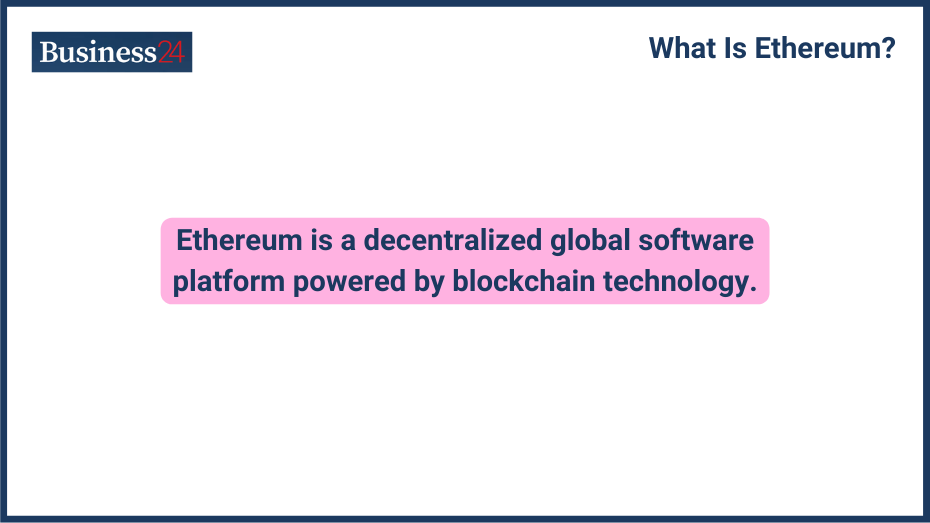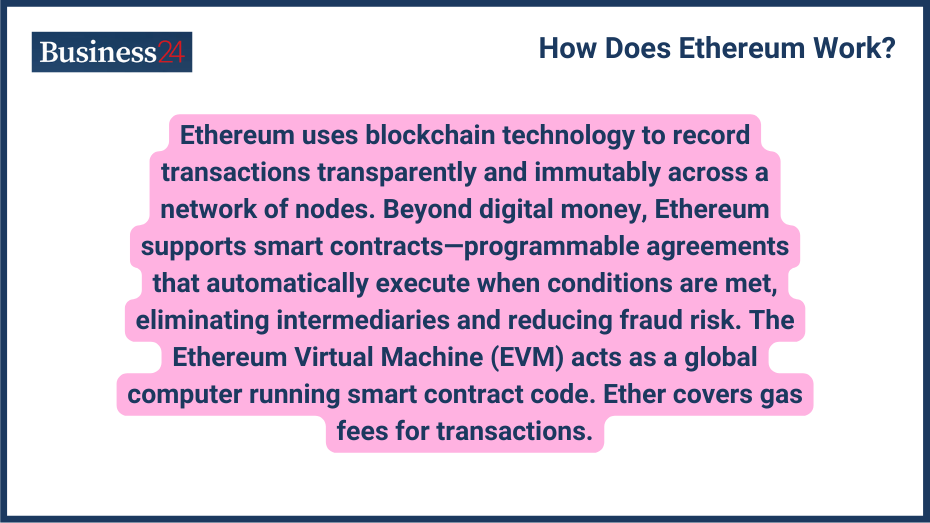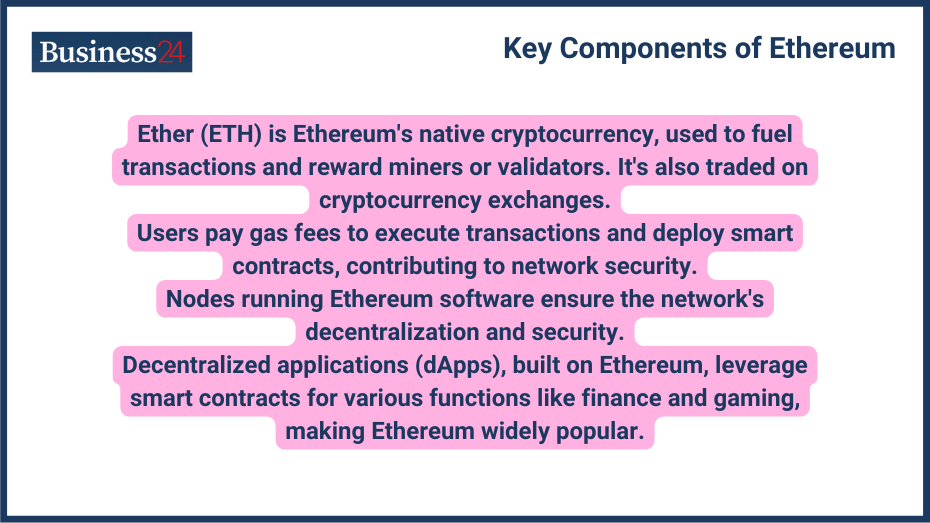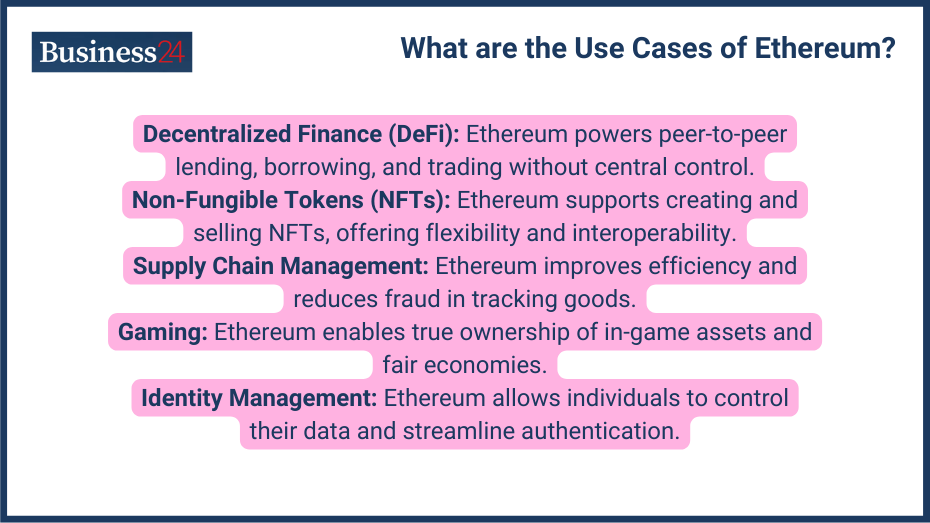
Ethereum is a decentralized global software platform powered by blockchain technology.
Ethereum is a decentralized platform that allows developers to create smart contracts and other applications. Ether is the native cryptocurrency of Ethereum. Ethereum is the biggest name in the crypto industry after Bitcoin. Developed by the Vitalik Buterin Ethereum has revolutionized the blockchain landscape.
What is the Definition of Ethereum?
Ethereum is a decentralized, open-source blockchain platform that facilitates peer-to-peer transactions of its native cryptocurrency, Ether (ETH), and the secure deployment of smart contracts – self-executing code that automates agreements and eliminates the need for intermediaries.
Unlike Bitcoin, which is currently mainly used as digital money, Ethereum’s blockchain is a versatile platform for various applications. It supports innovations in areas like supply chain management, gaming, and decentralized finance (DeFi).
As I said earlier, Ethereum is the brainchild of Vitalik Buterin. Ethereum story began in 2013 with a white paper authored by Vitalik Buterinc and was launched in 2015. Developers worldwide actively contribute to Ethereum’s development, with Vitalik as a leader.
What is Ethereum, and how does it work?

Ethereum uses blockchain technology. It records transactions transparently and immutably across a network of computers (nodes). However, as mentioned earlier, besides its use as digital money, Ethereum has many functionalities.
Ethereum uses smart contracts, which are programmable agreements on its blockchain. These smart contracts automatically execute their terms when certain conditions are met. This eliminates the need for intermediaries and reduces the risk of fraud or error.
Ethereum uses an “Ethereum Virtual Machine (EVM),” which is like a giant global computer made up of many individual computers running the Ethereum software. This acts as a decentralized computer that executes the code of smart contracts. Ethereum uses Ether to cover the gas fees.
Why is Ethereum so valuable?
One line answer to this question is that – Ethereum is so valuable because of its utility. It has an uncapped supply, and it is one of the most widely used blockchains, with a large developer community and many decentralized applications (dApps) built on it.
Ethereum is not just another crypto; the power it gives developers to build DeFi apps makes it much more valuable than any other crypto. Ethereum is widely adopted by developers and businesses. With continuous upgrades, like the move to Ethereum 2.0, it has become more scalable, secure, and energy-efficient, increasing its usefulness and value in the digital economy.
Is Ethereum a good investment?
For the long term, yes! Maybe its price can fluctuate in the short term, but Ethereum is a good investment because of its fundamentals and utility in the crypto market. However, keep in mind that the crypto market is highly volatile and risky. You shouldn’t put a large amount of money at once; keep a margin of safety and investment.
What are the Key Components of Ethereum?

Key components of Ethereum:
- Ether (ETH) Cryptocurrency: Every crypto network has a native cryptocurrency through which it operates; Ethereun’s native crypto is Ether (ETH). Ether (ETH) fuels transactions and serves as a reward for miners (under PoW) or validators (under PoS). It’s also a tradable asset on cryptocurrency exchanges.
- Gas and Transaction Fees: Users pay gas fees to execute transactions and deploy smart contracts on the Ethereum network. These fees are given to miners/validators and contribute to network security.
- Nodes and Network Participants: Computers running Ethereum software are nodes that contribute to the network’s decentralization and security. Different types of nodes exist, with varying roles and responsibilities.
- Decentralized Applications (dApps): Decentralized apps are the reason Ethereum is so much famous. These are applications built on top of the Ethereum blockchain that leverages smart contracts to deliver a wide range of functionalities such as finance (DeFi), gaming, etc.
What are the Use Cases of Ethereum?

Use cases of Ethereum are:
Decentralized Finance (DeFi): As I said, most of the Ethereum is used in DeFi. DeFi protocols built on Ethereum enable peer-to-peer lending, borrowing, and trading without the need for anyone who controls.
Non-Fungible Tokens (NFTs): Ethereum is the origin of NFTs; it provides the underlying infrastructure and power to the NFTs. Also, Ethereum is the most popular blockchain platform for creating and selling NFTs, as it offers a high level of flexibility and interoperability,
Supply Chain Management: Ethereum’s transparency and immutability make it ideal for tracking goods and materials throughout the supply chain, enhancing efficiency and reducing fraud.
Gaming and Entertainment: Ethereum is used in video games to keep true ownership of in-game assets and to create a transparent and fair economy within the gaming ecosystem.
Identity and Access Management: The main utilization of blockchain technology is decentralization. Ethereum empowers individuals to control their personal data and streamline authentication processes.
Is Ethereum better than Bitcoin?
Which is better depends on which functionalities you are comparing; the major comparison is that Bitcoin works better as a peer-to-peer transaction system, while Ethereum works well when you need to create and build distributed applications and smart contracts. For the application matter, Ethereum is a clear winner, while talking about simplicity and security for transactions Bitcoin is better.
What are the Benefits of Ethereum?
- Programmability and Flexibility: Programmability is the main benefit of Ethereum that allows one to make many innovative applications through smart contracts. This makes Ethereum better than any other crypto.
- Decentralization and Security: There is no central authority that makes it less prone to failures and also cryptography makes it more secure in safeguarding your investments.
- Transparency and Immutability: Every transaction on the Ethereum blockchain is transparent and secure; this increases the trust of investors and users on the Ethereum blockchain.
What are Ethereum’s challenges and risks?
- Scalability Issues: Issues like scalability can occur in Ethereum. Ethereum networks can become congested, leading to slow transaction times and high fees. Ongoing upgrades aim to address this challenge.
- Energy Consumption: Energy consumption is a big problem in cryptos and also in Ethereum. While the shift to Proof-of-Stake will improve energy efficiency, Ethereum’s current Proof-of-Work mechanism raises environmental concerns.
- Security Vulnerabilities: As with any complex system, Ethereum is susceptible to security vulnerabilities. Regular audits and updates are crucial for mitigating these risks.
- Regulatory and Legal Challenges: Another major problem is regulatory and legal changes; many countries still haven’t figured out how to manage the technology. Even big countries don’t have clear regulations regarding cryptos.
What is the Ethereum 2.0 Upgrade?
Ethereum 2.0, also known as Serenity, is a multi-phase process that aims to address scalability issues, enhance security, and open the way for a more sustainable Ethereum ecosystem. The major improvements are the proof of stake (PoS), sharding (partitioning the blockchain for faster processing), and beacon chains (coordinating validators).
About the update timeline, the Ethereum 2.0 upgrade is being implemented in phases, with some features already live and others on the horizon. Eth2 is expected to significantly improve major issues and solidify Ethereum’s position as a leading blockchain platform.
How to Buy, Sell, and Store Ether (ETH)?
To buy Ether (ETH) or any other crypto coin, you need a wallet and an exchange. You can buy and sell ETH in any crypto exchange. When you buy the crypto, the address is saved in your crypto wallet, which will give you access to the stored ETH.
When you are storing your crypto, implement strong passwords and two-factor authentication (2FA), and avoid sharing your private keys to safeguard your ETH. With your crypto wallet, you can manage your ETH balance, send and receive ETH, and interact with dApps on the Ethereum network.
What is the Future of Ethereum?
The crypto market is highly uncertain, so answering the question correctly is impossible. However, looking at the fundamentals, Ethereum’s future holds immense potential for innovation in areas like DeFi, DAOs (Decentralized Autonomous Organizations), and the Metaverse. The growth of the DeFi and NFT markets is expected to fuel demand for ETH, potentially placing it at the top.
Addressing scalability and regulatory hurdles will be crucial for Ethereum’s continued success. The developer community’s efforts and ongoing upgrades will shape the platform’s future. A strong and active developer community constantly innovates on the Ethereum network, driving its evolution and potential.
FAQs
Q: Is Ethereum a good investment?
Ethereum can be a good investment. While Ethereum offers high growth potential, it also comes with higher volatility and risks, particularly regulatory and technological challenges. So, it is important to keep these things in mind while investing.
Q: What is Ethereum mining?
While Ethereum is currently transitioning from Proof-of-Work (PoW) to Proof-of-Stake (PoS), mining was historically a way to earn ETH rewards. Miners used specialized computers to solve complex cryptographic puzzles to validate transactions and secure the network. Miners received newly minted ETH in return for their computational power.
Disclaimer
eToro is a multi-asset platform which offers both investing in stocks and cryptoassets, as well as trading CFDs.
Please note that CFDs are complex instruments and come with a high risk of losing money rapidly due to leverage. 51% of retail investor accounts lose money when trading CFDs with this provider. You should consider whether you understand how CFDs work, and whether you can afford to take the high risk of losing your money
This communication is intended for information and educational purposes only and should not be considered investment advice or investment recommendation. Past performance is not an indication of future results.
Copy Trading does not amount to investment advice. The value of your investments may go up or down. Your capital is at risk.
Don’t invest unless you’re prepared to lose all the money you invest. This is a high-risk investment and you should not expect to be protected if something goes wrong. Take 2 mins to learn more
eToro USA LLC does not offer CFDs and makes no representation and assumes no liability as to the accuracy or completeness of the content of this publication, which has been prepared by our partner utilizing publicly available non-entity specific information about eToro.
